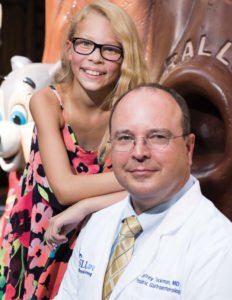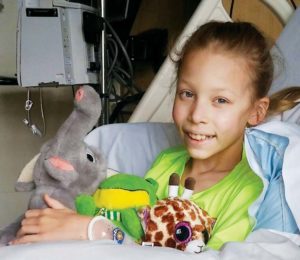Our Patients:
Madison Harbison

“Upset tummies are childhood rites of passage. Abdominal pain, constipation, vomiting and diarrhea bring many children to SSM Health Cardinal Glennon Children’s Hospital,” says Jeffrey Teckman, MD, director of gastroenterology and hepatology.
“Within those common complaints are a hundred possible causes. What we do is be sure it is not something rare or dangerous,” says Teckman, a SLUCare pediatrician and associate professor of pediatrics, biochemistry and molecular biology at Saint Louis University School of Medicine.
Kids with unusual and serious gastrointestinal and liver diseases routinely come from across the Midwest and occasionally other parts of the country to see one of the seven doctors in the gastroenterology/hepatology program at SSM Health Cardinal Glennon. U.S. News and World Report named it one of the best services in its field for 2015-2016.
“That ranking means we have a high level of sophistication and quality that is equal to the best of places. It shows we have a commitment to research and bringing new treatments to patients,” Teckman says.
Madison Harbison, 11, was one of many children who encountered gastrointestinal discomfort. She is one of the few diagnosed with a chronic condition, inflammatory bowel disease.
“When she was 3-years-old she started having complications when she would go to the bathroom,” says her mother, Michelle Harbison. “We were referred to Dr. Teckman and he did a colonoscopy that showed she had inflammation in her bowel.”
Medications and regular checkups have kept Madison’s colitis largely under control and allowed her to lead an active and productive life. She doesn’t remember much about her early years visiting the hospital but now has plenty of friends there. “It’s a very long list,” she says, “Dr. Teckman and lots of nurses and Child Life specialists. I have flare-ups sometimes but mostly I feel great. Being here has made a lot of difference.”
“Pediatric gastroenterology is incredibly broad. We take care of the intestine, the liver and the pancreas,” Teckman says. “We see kids who don’t grow or can’t eat. We see kids who have birth defects of the stomach and intestine, rare genetic diseases, food allergies and nutritional problems. We see patients who need liver transplants and some who have a stomach ache every Monday morning because they don’t want to go to school.
“Many of the kids may be burdened with a symptom but are generally healthy. Some kids have serious, incurable conditions that we usually can manage but maybe not eliminate. Children with serious liver disease may need a transplant,” he says. “We need to be cognizant of the science of medicine, genetics, biochemistry and nutrition as well as psychology. We want to help families cope socially and we want to see kids play. That is important, too.”
Teckman is one of the leading researchers of alpha 1-antitrypsin deficiency, a genetic disorder that can affect the lungs and liver. The GI/ hepatology staff is involved in national trials of new medications that have brought patients from as far away as Florida for participation.
“We have been one of the first centers in the country to partner with drug companies on hepatitis C treatments,” Teckman says. “We have cured several kids on these experimental treatments. They could not have been treated, let alone cured, two years ago. When I started medical school the hepatitis C virus hadn’t been discovered, although we knew a disease existed. Now I can write a prescription and cure it.”
For children who have gastroenterological diseases, “Life has changed dramatically,” he says. “We have many more treatments. Children spend much less time in the hospital and many used to need surgery early in life. Those things have not been eliminated but they are decreasing. Most of the several hundred patients we follow are in school today.”
Madison visits SSM Health Cardinal Glennon every six weeks for exams and blood draws while otherwise dancing, playing soccer and basketball, maintaining a 4.0 grade point average and serving on her student council. The sixth-grader is focusing on science classes to prepare for her chosen career.
“I am going to be a pediatric gastroenterologist. I want to help kids who have inflammatory bowel disease.”


